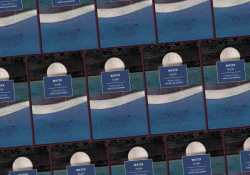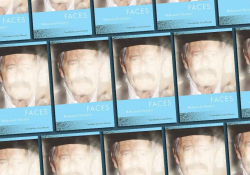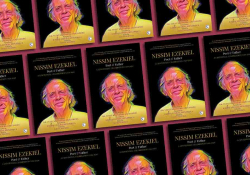Finding Etheridge
 There is something disconcerting about reading the unpublished poems of a great and passed poet such as Etheridge Knight. After all, these are poems the poet might have deemed unworthy or undesirable to share, and to suddenly have them available publicly is revealing. But that’s the thing about being a dead writer; you’ve had your say, and now the editors and public have theirs. While I felt a bit like I was sorting through someone’s private possessions postmortem while reading The Lost Etheridge: Uncollected Poems of Etheridge Knight (Kinchafoonee Creek Press, 2022)—which also includes published but uncollected work as well as work from out-of-print books—the insights it offers on this important figure in contemporary American poetry made all uncertainty about its appropriateness and purpose disappear.
There is something disconcerting about reading the unpublished poems of a great and passed poet such as Etheridge Knight. After all, these are poems the poet might have deemed unworthy or undesirable to share, and to suddenly have them available publicly is revealing. But that’s the thing about being a dead writer; you’ve had your say, and now the editors and public have theirs. While I felt a bit like I was sorting through someone’s private possessions postmortem while reading The Lost Etheridge: Uncollected Poems of Etheridge Knight (Kinchafoonee Creek Press, 2022)—which also includes published but uncollected work as well as work from out-of-print books—the insights it offers on this important figure in contemporary American poetry made all uncertainty about its appropriateness and purpose disappear.
Etheridge already had legendary, canonical status in contemporary American poetry. Well-known work such as “The Idea of Ancestory” and “Hard Rock Returns to Prison from the Hospital for the Criminally Insane” can be found in most Norton and other anthologies of contemporary US poetry. The Essential Etheridge Knight, a 1986 collection of the best of the best from all his previous works, presents a complex mix of identities and voices: prison, street, academy, junkie, lover, fighter, revolutionary, and dreamer. The Lost Etheridge further adds to the picture. In the words of the volume’s editor, Norman Minnick, it “attempts to serve as a companion to The Essential Etheridge” with “over 200 poems from out-of-print books, literary journals, and those left in typescript and notebook form hidden away in university archives.” While forthright and concise, I would have appreciated an extended editor’s note with more about the process of finding and gathering this work as well as the selection process for the previous published and collected work that is included. However, Yusef Komunyakaa’s foreword is spot-on. In it, he writes, “this collection may make one feel the poet has been caught in the middle of working his signifying magic, making, and willing the spoken into the written, since he was known to bend time by reliving and teasing language into then and now, past and present.”
The Lost Etheridge underscores the power, brilliance, humor, and humanity in Etheridge’s work.
There are nine sections total beginning with Unpublished Poems (1964–1968), which features work full of promise by a young, autodidact poet who is a bit romantic, highly alienated, and bravely committed to recording his lived experience in prison. For example, “I See No Single Thread” begins, “I see no single thread / that binds me one to all; / even the common dead / each took the single fall.” “On the Way to Prison” ends, “I felt chains round / my waist, / cuffs round my / hands, / a crack round my / heart, / as black birds / of freedom spilled / out.” Etheridge, clearly talented from the get-go, was committed to poetry and on his way out of prison at the end of this time.
Selected poems from Poems from Prison (1968) and Belly Song (1973), now out of print, follow before the next section of unpublished poems from 1968–1981, which demonstrates a growing maturity and a poet whose range of voices and aesthetics was impressive. Some poems, such as “Fire Circles Rainbows,” do feel a bit lesser, which suggests why they were unpublished: “Dream Dream fairy frog. / What are we to flower / petal so pale in the / sunshine?” Yet it is a pleasure to see Etheridge stretching his voice and material (he seemed to have Jimi Hendrix–like fascination with fairy-tale and fantasy material) even if the result wasn’t so successful. Other unpublished, uncollected poems such as “New Militant,” “Memo #1,” and “What Is Love” are so damn good you can’t help but wonder about the entire publishing process. Here’s “New Militant” in its entirety:
I froze my feet
parking cars
on New Year’s Eve.
The white ladies
were dressed so fine.
Something in me
snapped.
An earlier poem such as this nicely connects to poems such as “A Poem for 3rd World Brothers” and “Welcome Home, Andrew Young,” which were published in Born of a Woman and are included in this collection too.
The next section, Unpublished Poems (Dates Unknown), features several blues poems, a rallying cry to all prison-writing and justice volunteers titled “No, I Can’t Go to Jamaica This Year . . . I’m Goin to Jail Instead,” and the gorgeous, Robert Creeley–influenced poem “What We Make of It.” This section is followed by Uncollected Poems, which contains the notable “Haiku for the Homeless,” “Hat Questionnaire,” and “Warning.” The final two sections are Unpublished Poems (1982–1991), which presents some of the most personal and vulnerable work following his cancer diagnosis; and Prose, which consists of “Preface to Born of a Woman,” “Lend Me Your Ear,” an essay on prison poetry, and “On the Oral Nature of Poetry.”
Dozens of connections between process and product, unpublished and published, could be made in all this work. On one hand, this monograph provides the reader a chance to do exactly that and to see, as Komunyakaa says, “the poet . . . caught in the middle of working his signifying magic.” On the other hand, more of an introduction by Minnick would have been helpful, especially to readers familiar only with canonical Etheridge or new to his work entirely. Even so, this is a tremendous, timely, and worthwhile collection that underscores the power, brilliance, humor, and humanity in Etheridge’s work, highlights his importance to contemporary American poetry, and prepares the way for a collection of his complete works.
University of Oklahoma















